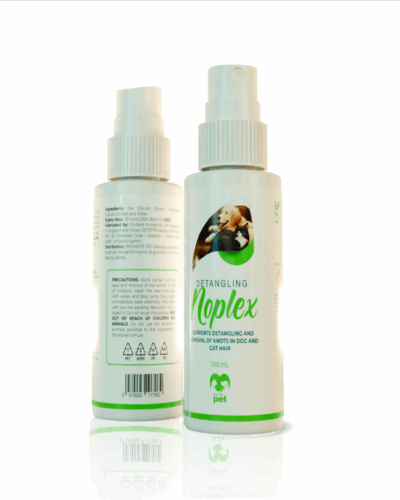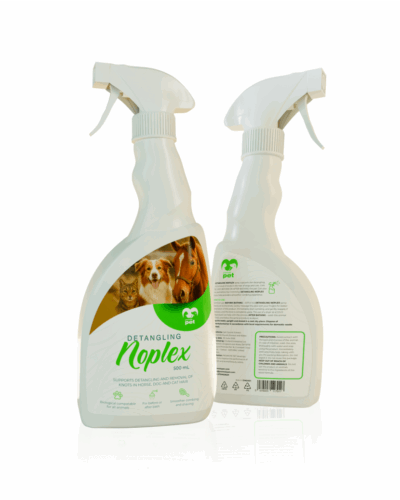Free delivery for orders over £45

The Importance of Regular Veterinary Check-Ups for Your Pet
Table of Contents
Regular check-ups at the vet are crucial for maintaining your pet’s overall health. Frequent pet vet visits not only help in early detection of diseases but also ensure proper vaccination and preventive care. In this guide, we’ll explore the benefits and importance of consistent veterinary check-ups, so you can ensure your furry friend’s well-being and longevity.
Why Regular Pet Vet Visits Matter
Regular veterinary visits are crucial for preserving an animal’s health and wellbeing. Many pet owners underestimate the importance of routine check-ups until complications arise. These consultations allow veterinarians to identify health problems before they become serious, ensuring that pets can live long, healthy lives. During these visits, vets assess many aspects of an animal’s well-being, including their physical health, behaviour, and diet.
Early detection of potential issues, such as dental problems, weight issues, and early signs of chronic diseases, can lead to more effective treatments. For example, regular dental checks can prevent periodontal disease, a common issue in pets that can lead to serious health conditions. Routine vaccinations, another vital part of veterinary care, protect pets from contagious diseases.
Vet visits also provide an opportunity to discuss nutritional needs. Dietary recommendations play a significant role in preventing obesity and ensuring a balanced intake of nutrients. Vets can tailor advice based on an animal’s age, breed, and lifestyle, which informs decisions on appropriate exercise regimens as well.
Behavioural assessments are another critical component. Any changes in a pet’s behaviour can signal underlying health problems. Regular vet visits allow for discussions about changes in behaviour, ensuring any concerns are addressed promptly. Furthermore, preventive measures like parasite control and grooming advice are frequently covered in these visits, reducing the risk of conditions such as flea and worm infestations.
Key Benefits of Veterinary Check-Ups
Enhanced Prevention and Early Detection: Routine veterinary check-ups play a vital role in detecting diseases at an early stage. By performing regular examinations, veterinarians can identify issues such as dental disease, obesity, and potential infections before they become serious problems. Early detection leads to more effective treatments and a greater chance of a full recovery.
Tailored Nutrition and Exercise Advice: Every pet is unique, with specific needs based on factors like age, breed, and lifestyle. During a check-up, a vet can provide personalised dietary recommendations and exercise routines to ensure pets maintain a healthy weight and receive balanced nutrition. This proactive guidance can prevent the development of various health conditions.
Updated Vaccinations and Parasite Control: Keeping up with vaccinations is essential for protecting pets from preventable diseases. Veterinary check-ups provide an opportunity to ensure pets are up to date with their shots. Additionally, vets can offer advice on parasite prevention, safeguarding pets from fleas, ticks, and worms.
Behavioural Insight: Pets, much like humans, can have behavioural challenges. Regular visits allow vets to observe and discuss any changes in pets’ behaviour, which might indicate underlying health issues or need for behavioural adjustments. This insight helps pet owners understand their pets better.
Dental Health Maintenance: Oral health is a significant component of overall pet wellness. Many pets suffer from dental issues that go unnoticed by owners. Vets can perform dental checks and cleanings during routine visits, preventing dental disease that can lead to pain and systemic infections.
Monitoring of Aging Pets: As pets age, their needs change. Regular veterinary visits are essential for monitoring older animals for common age-related conditions like arthritis or kidney disease. Timely interventions can improve the quality of life and longevity of senior pets.
When to Schedule Pet Vet Visits
Deciding on the right time for veterinary visits is crucial for maintaining your pet’s health. Young pets require different attention compared to their older counterparts. For puppies and kittens, initial visits should begin immediately after adoption to start immunisation schedules and address early health concerns. Regular appointments every 3-4 weeks until they’re about 16 weeks old are typically recommended.
For adult animals, annual or semi-annual appointments are essential. These visits allow vets to update vaccinations, assess overall health and discuss any changes in behaviour or diet. Age isn’t the sole factor. Consider your pet’s specific needs, breed health concerns, and lifestyle. Some breeds might need more frequent check-ups due to predisposed health issues.
Senior Pets
As pets age, their health care needs increase. Senior pets may benefit from vet visits every 6 months to monitor for any age-related illnesses and ensure any new symptoms are investigated quickly. Routine blood tests and screenings become more important during this life stage.
Consider scheduling a visit if you notice any changes in weight, appetite, thirst, energy levels, or unusual behaviours. Early intervention could prevent more severe issues down the line, so erring on the side of caution can be vital. Stay informed about your pet’s specific needs and consult your vet for a tailored schedule.
Essential Health Tests for Pets
Veterinary testing plays a vital role in ensuring your pet’s health and wellbeing. Pets, much like humans, require routine evaluations to detect potential health issues early on.
One of the essential health tests is a blood test. These tests are crucial for evaluating internal organ function, identifying infections, and determining overall health status. Blood tests can help detect conditions such as diabetes, kidney disease, or anaemia at early and more manageable stages.
Another important test is the urinalysis. Regular urine analysis can provide valuable insight into your pet’s kidney and urinary tract health. It is also instrumental in diagnosing issues such as urinary infections, diabetes, and kidney disease.
Stool sample tests are fundamental for checking for the presence of intestinal parasites like worms, which can seriously affect your pet’s health if left untreated. Regular fecal exams ensure timely treatment and prevention of these infestations.
For older pets, an annual thyroid screening can be essential. This test checks for thyroid dysfunction, which is common in aging animals and can lead to weight issues, energy loss, and more severe health complications if untreated.
Heart health is also very important. Your veterinarian might recommend echocardiograms or other cardiovascular evaluations to assess heart function, especially in breeds predisposed to heart disease.
Lastly, timely vaccinations are indispensable as they protect against common and potentially fatal diseases. Ensuring your pet’s vaccination schedule is up-to-date helps maintain their immune system.
By conducting these essential health tests regularly, you become proactive in managing your pet’s health, potentially sparing them from discomfort and severe ailments.
What to Expect During a Vet Visit
A veterinary visit is a crucial aspect of pet health care. During a visit, the vet checks your pet’s general health, which includes their weight, temperature, and other vital signs. This thorough examination helps vets detect early signs of diseases or conditions that may not be obvious at home.
Physical Examination: The vet will assess your pet’s body condition and check for lumps, bumps, or unusual skin conditions. They might use a stethoscope to listen to the heart and lungs’ sounds. This is to ensure that your pet’s cardiovascular system is functioning correctly.
Behavioural Observations: Vets often observe your pet’s behaviour. Changes in activity levels or appetite can indicate health issues. They’ll ask about any changes you might have noticed at home.
Parasite Control: During the visit, the vet will discuss parasite prevention, such as treatments for fleas, ticks, and worms. They might recommend periodic treatments based on the pet’s exposure risk and environment.
Vaccination Updates: Pets may receive booster shots or vaccinations if they are due. Keeping vaccines up-to-date is essential for preventing infectious diseases.
Dental Health: Oral health is vital for overall well-being. The vet will check the teeth and gums. They may recommend dental cleaning or procedures to prevent oral diseases.
Nutritional Advice: Depending on your pet’s age, weight, and health status, the vet will offer dietary recommendations. Proper nutrition supports their long-term health.
Follow-Up Care: The vet will outline any necessary follow-up visits or treatments. Keeping up with these recommendations is key to maintaining your pet’s health. Regular communication with your vet ensures you are informed about any developments concerning your pet’s health.
Common Concerns Addressed by Vets
- Pet owners often have questions about their pet’s health and behaviour. Vets are equipped to address these concerns by providing insights and expert advice. Whether it’s unusual lumps, skin conditions, or changes in appetite, a vet can determine if these are part of normal development or if they require further investigation.
- Another frequent concern is vaccination schedules and the necessity of boosters. Vets can clarify which vaccines your pet needs and when they should be administered to ensure maximum protection against diseases.
- For those with older pets, concerns around ageing and lifestyle changes are common. Vets can offer guidance on adjusting diet and exercise to better suit an ageing pet’s needs, as well as recognising early signs of arthritis or other age-related conditions.
- Behavioural issues such as anxiety or aggression can also be troubling for pet owners. Vets can identify whether these issues have a medical basis, offering referrals to behaviourists if necessary.
- It’s not uncommon for pet owners to worry about dentistry and oral health. Vets provide routine dental check-ups and cleanings, also highlighting warning signs of dental disease before they become serious.
- Nutritional concerns are frequent topics too. Vets can help create a diet plan that ensures your pet is receiving all necessary nutrients for their stage of life and activity level.
Vets are invaluable resources for addressing these issues, offering peace of mind and ensuring the well-being, which strengthens the bond between pets and owners.
Tips for Stress-Free Vet Visits
Ensuring your pet has a calm and stress-free experience at the vet is crucial for both their comfort and the effectiveness of the check-up. One effective approach is to familiarise your pet with the travel crate. Place the crate in their environment a few days prior to the visit, encouraging them to explore it at their own pace.
Driving calmly is another key strategy. Maintain a smooth and gentle driving style, avoiding sudden stops or loud music, as these can increase your pet’s anxiety.
Once at the vet, using positive reinforcement can make the experience more pleasant. Bring along their favourite treats to reward them for calm behaviour. Many pets respond well to treats, which can help distract them from the unfamiliar setting.
Consider booking appointments during less busy times. A quieter waiting room naturally reduces stress levels for both you and your pet. If your pet is especially nervous, request to wait outside until the vet is ready.
Communicating with your vet is vital. Share any prior experiences of stress your pet has had with them. This allows the vet to tailor their approach, offering a more personalised and less stressful visit.
Contact Us
- +44 07391626201
- info@promotepet.com
- 16, Cromwell Close - Oxford - UK
COPYRIGHT © PROMOTE PET. ALL RIGHTS RESERVED. © 2024 Chofard Enterprise Ltd. Chofard Enterprise is a company registered in England and Wales with a company number 13073779 VAT number GB 370644889. 16, Cromwell Close, Oxford OX30RW, United Kingdom – trading as Promote Pet Online Shop.











